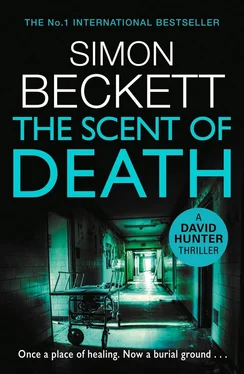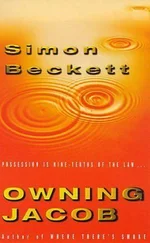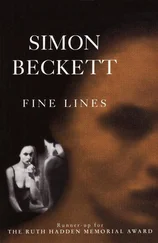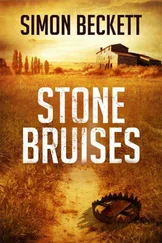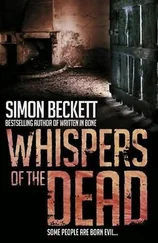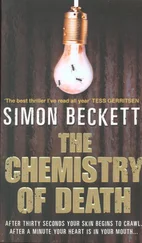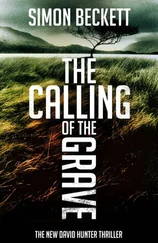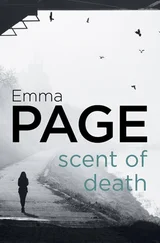Simon Beckett
The Scent of Death
To my Dad, Frank Beckett, who always put things in perspective.
July 1929 — April 2018
Most people assume they’d know the scent of death. That decay has a distinctive, readily identifiable odour, a foul reek of the grave.
They’re wrong.
Decay is a complicated process. For a once-living organism to become skeletonized, reduced to dry bone and minerals, it first has to undergo an intricate biochemical journey. While some of the gases created are offensive to human senses, they’re only part of the olfactory menu. Decomposing flesh can produce hundreds of volatile organic compounds, each with its own characteristics. Many of them — particularly those created during the mid-stages of a body’s dissolution, those of putrefaction and bloat — possess an undeniable stench. Dimethyl trisulphide, for instance, is reminiscent of rotting cabbage. Butyric acid and trimethylamine have the respective bouquets of vomit and old fish. Another substance, indole, carries the stink of faecal matter.
Yet in lower concentrations indole has a delicate, floral scent that’s prized by perfume manufacturers. Hexanal, a gas produced in both the early and later stages of decay, resembles freshly cut grass, while butanol is redolent of fallen leaves.
The aroma of decomposition can encompass all these notes, as complex as a fine wine. And, because death is nothing if not full of surprises, in some circumstances it can announce itself in a different manner entirely.
Sometimes in a way you’d least expect.
‘Watch your footing, Dr Hunter,’ Whelan warned from ahead of me. ‘You step off the boards and you’ll be through the ceiling.’
He didn’t need to remind me. I ducked under a low beam, careful where I was putting my feet. The cavernous loft was like an oven. The day’s heat had been trapped under the slate roof, and the mask I wore made it hard to breathe. The elasticated hood of my protective coveralls cut into my face, and my hands felt slick and hot inside the skin-tight nitrile gloves. I tried again to wipe the sweat from my eyes, succeeding only in smearing it.
The old hospital’s loft was huge. It extended off in all directions, disappearing into darkness beyond the glare of the temporary lighting. A walkway of aluminium stepping plates had been laid down, bending and flexing under our combined weight as we clattered over them.
I hoped the joists underneath weren’t rotten.
‘You know this part of London?’ Whelan asked over his shoulder. The detective inspector’s accent put his roots far north of where we were now, nearer the Tyne than the Thames. He was a thick-set man in his forties, and when he’d met me earlier the wiry grey hair and beard had been damp and sweat-flattened. Now his face was all but hidden under the mask and white coveralls.
‘Not really.’
‘No, it’s not the sort of area you come to without good cause. Not even then, if you can help it.’ He stooped to pass under a sloping roof timber. ‘Mind your head.’
I followed his example. Even with the stepping plates, moving around in the loft was hard going. Thick wooden beams criss-crossed overhead, waiting to crack the skull of anyone who didn’t crouch low enough, while old pipework snaked across the joists at ankle height, ready to snag a carelessly placed foot. Every now and then, apparently at random, blackened brick chimney stacks rose up to block a direct route, forcing the stepping plates to detour around them.
I brushed away a cobweb that stroked my face. Clogged with dirt, they hung from the rough roof timbers like ragged theatre swags. The dust covered everything in the loft, turning the once-yellow insulation between the joists into a filthy brown mat. Motes of it swirled in the air, glinting in the bright lighting. My eyes already felt gritty, and I could taste it in my mouth despite the mask.
I ducked as a quick movement, more sensed than seen, seemed to flit overhead in the shadows. But when I looked all I could see was darkness. Chalking it up to imagination, I concentrated on watching where I put my feet.
Up ahead, a circle of lights marked our destination. Under their glare a cluster of white-clad figures stood on a wider island of stepping plates set around a chimney stack. A murmur of conversation drifted from them, muffled by their masks. A Scenes of Crime Officer was taking photographs of something that lay at their feet.
Whelan stopped just short of the group. ‘Ma’am? The forensic anthropologist’s here.’
One of the group turned towards me. What little of her face was visible above the mask was flushed and shiny from sweat. In the baggy white coveralls it would have been hard to say if she was man or woman if I hadn’t already known, but this wasn’t the first time we’d worked together. As I went over I saw they were standing around an object wrapped in plastic tarpaulin, like a rolled-up carpet. One end of the plastic had been partially undone.
Gazing out from it, toffee-coloured skin drawn taut over cheekbones and hollow eye sockets, was a mummified face.
Distracted, I didn’t notice the low roof beam until I banged my head on it, hard enough to jar my teeth.
‘Careful,’ Whelan said.
I rubbed my head, more embarrassed than hurt. Good start . A half-dozen faces regarded me over masks, unimpressed. Only the woman Whelan had addressed seemed amused, eyes crinkled with a smile hidden by her mask.
‘Welcome to St Jude’s,’ DCI Sharon Ward said.
Twelve hours earlier I’d woken from a nightmare. I’d bolted upright in bed, not sure where I was, my hand automatically going to my stomach, feeling for the expected stickiness of blood. But the skin was dry, unmarked except for the trace of a long-healed scar.
‘Are you OK?’
Rachel was propped up on an elbow, a hand resting against my chest in concern. Daylight filtered through the heavy curtains, revealing a room that was only now taking on recognizable lines.
I nodded as my breathing slowed. ‘Sorry.’
‘Another bad dream?’
I flashed to gouts of dark blood and a knife blade glinting in the sun. ‘Not too bad. Did I wake you up?’
‘Me and everyone else.’ She smiled at my expression. ‘I’m joking . You were just thrashing around, no one would have heard. Was it the same one?’
‘I can’t remember. What time is it?’
‘Just after seven. I was going to get up and make coffee.’
The vestiges of the nightmare still clung to me like a cold sweat as I swung my legs from the bed. ‘It’s OK, I’ll make it.’
Pulling on some clothes, I went out and softly closed the bedroom door behind me. Once I was alone in the hallway my smile faded. I took a deep breath, trying to shake off the after-effects of the dream. It wasn’t real, I reminded myself.
Not this time.
The house was quiet, suspended in the early-morning hush that precedes a new day. The heavy chunk of a clock punctuated the silence as I padded down to the kitchen. The thick pile of the hall carpet gave way to slate tiles, pleasantly cool under my bare feet. Although the air held some of the previous day’s warmth, the stone walls of the old house rebuffed even the heat of the Indian summer we’d been enjoying.
I filled the percolator and set it on the Aga before running myself a glass of water. I drank it at the window, looking out over the orchard to green fields. The sun was already shining from an unlikely blue sky. Sheep grazed in the distance, and a small wood stood off to one side, the leaves on the trees already shading red. They hadn’t started to fall yet, but it wouldn’t be long. The scene was like a photograph on a gift-shop calendar, where nothing bad could ever happen.
Читать дальше
